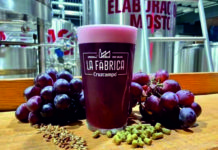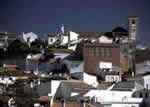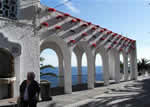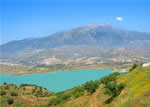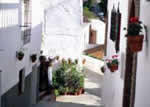
Extracts from the best selling book "In the Garlic" by Valerie Collins and Theresa O'Shea Stay a while in Spain, and beyond the sunshine, fiestas, Rioja and laidbackness you may find yourself drifting in an uncharted ocean of unwritten laws, linguistic minefields and mysterious quirks. You need to be In the Garlic – en el ajo – in the know.
Número Just make sure you get one. Some places have one or several number machines, others have receptionists who scribble them on bits of paper. At places like big council offices or the Seguridad Social, you may need human help just to figure out which option to punch on the high-tech número generator. If there are no números, for example, at the bakery or the fishmonger's, find out who's last by shouting “¿Quién es el último?” at the milling crowd (“la última” for all-female throngs) and stick like a limpet to whoever responds.
Ñ Pronounced 'enye'. Not just the 17th letter of the Spanish alphabet, but a cultural icon, as Spanish as paella, Rioja, Don Quixote and especially mañana (manyana, por favor). Originally the ñ developed from a double n, which scribes in the Middle Ages improvised to represent the new 'ny' sound that had developed in the spoken language. Eventually, they opted for dropping a wiggly line on top of a single n. Thus, sennor became señor and sennora, señora. Our old Simon & Schuster (bilingual) dictionary has just 44 entries for words beginning with the letter, the most difficult of which to pronounce is ñoño or ñoña, meaning dimwit or stupid. In Catalan the sound is written the way we would write it in English, as the digraph 'ny'. Hence, in Catalan, it's Catalunya – not Cataluña.
Ojalá I wish, if only. From the Arabic “law sh'aa Allah” (if God were willing).
Persiana A blind. Those of us who have been here a long time invariably find ourselves mystifying visitors by talking about persian blinds or even
persians. The person who fixes persianas is the persianero. Like plumbers, glaziers and locksmiths, persianeros have emergency numbers and, naturally, will charge you a small fortune when you're on your balcony hanging out the washing or spying on the neighbours and the persiana cord snaps. Venetian blinds are, logically, persianas venecianas.
Piñata Essential for kids' parties. The piñata is a cardboard container stuffed with sweets and lollipops which is hung from the ceiling (or wherever you can manage). The kids have to smash it with a stick (or umbrella) whereupon it falls apart and they get over-excited and roll around on the floor screaming and kicking and fighting over the contents. We think the original tradition requires this to be done blindfold (we mean the bashing with the stick), but this is clearly not a sensible idea.
Puticlub Sounds so cute, like a Saturday morning cartoon show. In fact, puti comes from puta, meaning whore, and a puticlub is a bar-cum-brothel. Also known more euphemistically as clubs de alterne (hostess clubs), they are normally located out of town on quiet secondary roads, their tell-tale neon lights flashing like mini-Las Vegases. Regardless of what they say, most Spanish men have been to one, if only for a very expensive glass of coloured water. In the macho business world it is still customary to wind up an evening of wining and dining your clients with a trip to the local puticlub.
In the Garlic: Your Informative, Fun Guide to Spain is published by Santana and is available at all good book shops (ISBN 13:978-84-89954-59-5)
©Valerie Collins and Theresa O'Shea 2008






